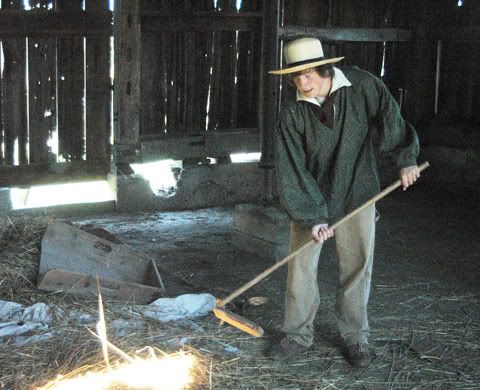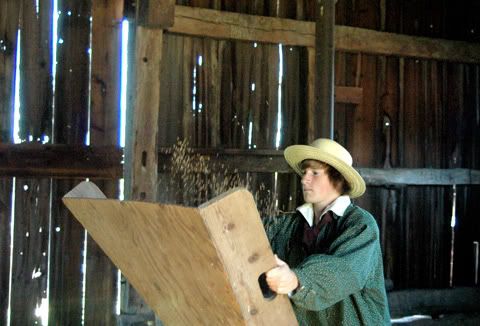
In the days when my grandfather and great-grandfather were farming peanuts and cotton in the Florida panhandle the rule of thumb was that a man with a good mule could plow an acre a day.
My friend Ellen quickly computed that it would take a third of a year to plow a 100 acre plot of land, which of course made it impossible for a family to farm large tracks of land. The labor involved in harvest was equally daunting until the invention of the steam engine and mechanized farm equipment.
This volunteer at Garfield Farm Museum is demonstrating threshing wheat by hand. That length of wood has a free-swinging piece on the end that would flail the wheat and separate the grains of wheat from the stalks. The wheat grains would fall to the bottom.
That left wheat grains that needed to be separated from the chaff, which is paper thin and lighter than the actual grain. The wheat would be loaded into this box and tossed into the air. This method depended upon a windy day, which would blow the chaff away, leaving only the grain.

All you had to do was to process enough grain to send off to the grist mill for grinding, and only then could you make a loaf of bread. Oh.....AFTER you gathered the eggs from the henhouse.
8 comments:
That boy threshing wheat should get together with the girl spinning wool and head off to the mall together. It's so much easier to get the basics of life at the mall!
Yes, you're right Pablo! All made possible by mechanization.
Oh, and I forgot. Here's a not-so-funny story that points out how our young people have no clue about where they food comes from.
We're in the local food store and I comment to my husband about the asparagus. It was certainly not asparagus season and I said, "I wonder where this asparagus came from", meaning of course that I wondered where on the planet it was currently in season. Probably somewhere south of the equator, or a hot house.
The young man working in produce overheard me and interjected in his most authoritative voice -
"The asparagus comes from the warehouse"
!!!!!!!
Indeed.
This is a great post - and your photos are as usual, wonderful.
As for the asparagus - it is likely produced in a place that is using chemicals long banned in the US.
One time my husband's cousin and uncle were commiserating over the price of water. They live in a small city in Montana. Both were complaining of their water bills. Grandma perked up and asked, "How far did you have to go for that water, and how far did you have to pack it?"
Smart lady. . .
I like this post! I'm always interested in how folks managed their daily lives before cheap energy (gas, electric). When threshing the grain, does she cut wheat out in the field and then flail it with the wooden thingy while the wheat is lying on the ground or barn floor? Does she beat on it or kind of rake it, or try to toss it in the air, or what?
I crave more info :)
The wheat is cut in the field and in this case brought into the barn and laid out on a large cloth tarp. That wooden tool is used to flail the wheat on the barn floor. The box would have been used inside the barn with both barn doors open so that a cross wind would blow the chaff and the grain would fall directly to the floor. I'm guessing that this was done inside the barn to make chaff clean up easier.
My mom is painfully aware of doing everything by hand. When my dad was away doing his second stint in the U.S. Navy (WW2 and called back in for Korea) , my mom, my brother an myself lived in a sharecroppers shack on old family property in Florida. No electricity, no water, no running water, no glass windows or screens - only shutters, one fireplace. We did take our meals at my uncle's farm up the road.
My Chicago-raised mom offered to pick cotton for my uncle. HA HA. She lasted one day and just about died in the effort. She showed up in what she felt would be cotton-picking regalia - cute shorts, a 50's era halter top and a Lucille Ball type bandana tied smartly on her head. HA HA HA HA HA. Did the field hands have a big hoot at the sight of that!!!
Now we stand in front of the microwave impatiently counting the SECONDS it takes to "cook" food.
Nothing available today would match the midday meal my aunt would cook for the field hands. WOW.....including freshly churned butter.
Post a Comment